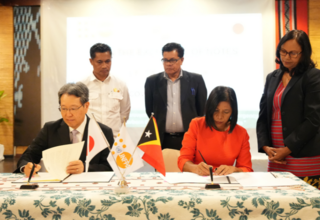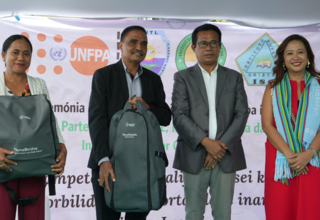A high-level advocacy workshop was held in the morning of 23 August 2012 to sensitize policy makers, stakeholders and midwives on the International Confederation of Midwives (ICM) midwifery standards. The Regional Asia –Pacific Regional ICM midwife advisor Ms Pashtoon Azfar was the guest of honor of the event. She presented the ICM standards, the 3 pillars of the midwifery programme and the need to strengthen the midwifery programme in order to ensure that every Timorese midwife is able to give quality midwifery services for mothers, newborn and families in the country which can significantly contribute to attaining MDG 5 that is to improve Maternal Health.
She highlighted that it is critical that all 3 pillars of the midwifery programme namely education, regulation and association need to be equally strong for the programme to succeed. It was well attended by some members of parliament from Commision F, the Vice-Minister and department heads from Ministry of Health, WHO, UNICEF, USAID-HADIAK, 100 midwives and midwifery students from the private and public sector and officers from the APTL who served as the main organizer of the workshop.
Opening speeches were delivered by 3 prominent figures. First was the President of the APTL, Dr Lidia Gomes who emphasized the importance of the 3 pillars of the midwifery programme and the need to support the plan for establishment of a regulatory mechanism that will govern the practice of midwifery in the country. The second was relayed by Mr Pornchai Suchitta, UNFPA –TL Representative, who acknowledged the crucial role of midwives being frontline providers of maternal health services to the lowest health delivery points and to the community and expressed UNFPA’s support to help strengthen the midwifery programme in Timor Leste. Finally, the Vice Minister for Health, Sra Natalia de Araujo, who officially opened the workshop. She expressed her gratitude for all the efforts being made by midwives and partners to further improve the midwifery profession and services in Timor Leste. However, she stressed that only with strong leadership, commitment and support can the 3 pillars move forward to a direction that will create significant impact to all mothers, babies and children.
The workshop was followed by a GAP analysis participated by educators from the UNTL and INS, relevant government officials, a member of parliament from commission F, midwives from the private sector and members and officers of the midwifery association in Timor Leste. The GAPS identified were based from the responses of midwives who were provided with the ICM education, regulation and association or MACAT gap tools a few months before the actual workshop.
The participants in the process, came up with strategic directions, prioritized the strategies and subsequently developed specific activities based on the gaps identified in each pillar. These strategies and specific activities under every pillar were consolidated and harmonized to become one strategic action plan for the midwifery programme of Timor Leste.
Finally, this strategic action plan is being presented back to all key policy leaders, decision makers for health, development partners and to all midwives who believe that the lives of mothers, babies, young people and couples are important. It is hoped that with the action plan finalized and commitment of support expressed by key players in the health sector together with stakeholders and all midwives, that implementation of the plan will proceed accordingly and expected results is achieved. Ultimately, a follow-up on the progress of this plan is crucial and hence should be lead by champions committed to ensuring that all 3 pillars are moving to the right direction.



